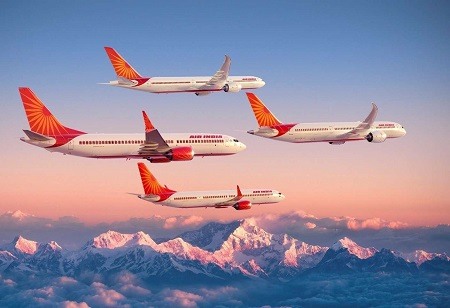The agreements signed between
Air India - the National Carrier of India and Airbus and Boeing on the 14th of Feb to acquire around five hundred aircraft is not just an exempler of India's growing economic might but it has also reaffirmed the country's image as a "bright spot in the global economy."
Air India has signed one of the largest single aircraft orders by any airline at a time when several developed economies are staring at the possibility of either recession or a deep economic slowdown in 2023.
This deal has made a positive impact and it can be understood from statements made by the US President, French President and UK Prime Minister, while Biden called it a "landmark deal" & stated that it will help in creating up to 1 million jobs across forty-four states in the US as well.
The total number of aircraft ordered from
Airbus and Boeing is four hundred and seventy planes. This is the largest-ever single order in the history of commercial aviation, although the numbers do not comprise the options for 70 more planes that would make the total order to five hundred and seventy aircraft.
In this article we will be looking at why this historic deal is significant for India and how will it impact the economy of the country as well.
Job opportunities for 200000 candidates
The latest mega deal between Tata-owned Air India and aircraft makers Boeing and Airbus will create over 200000 jobs in India, directly and indirectly, according to top aviation sector experts. Under the deal, Air India, which currently has a fleet of 140 planes will buy 470 aircraft from Boeing and Airbus.
According to experts, this deal will lead to creation of a flurry of jobs in the Indian
aviation industry
since the airline would need operational staff and employees for ancillary roles.
Mark Martin, CEO, Martin Consulting stated that there would be two types of jobs that will be created – one will be direct and the other would be indirect employment and the total direct and indirect jobs created for a narrow-body aircraft is around four hundred and for a wide body plane is around six hundred to seven hundred.
This can further be broken down where direct employment will comprise those employees who are directly employed by the airline for instance the pilots, cabin crew, both technical & non-technical staffs, while indirect employees who are external to the organization, supporting the aircraft comprising airport staff, air traffic controllers, service providers, transport vendors and others. And this number would come up to four hundred for a narrow body plane.
Direct employment in a wide-body plane is somewhere around two hundred and fifty to three hundred and after including indirect employment it can reach around six hundred to seven hundred.
Boosting the infrastructure & tourism sector in India
Although Air India would now need cabin crew members, maintenance engineers, experienced pilots, ground crew etc., the most significant part of this deal is that flights would now reach locations which are not yet connected through airways & this would bolster the infrastructure and tourism industry in those locations.
Independent aviation adviser Bertrand Grabowski told Reuters that the deal is important for the industry because, given the recent turbulence in the China market, the alternative growth market is India."
Augmenting domestic manufacturing of aircraft parts
While the deal is set to create jobs for Indians, the Chairman of Tata Group has hinted that some of the aircraft parts could be manufactured in India and this will boost domestic manufacturing and further create job opportunities.
Emmanuel Lenain stated that the Air India & Airbus deal serves as a testament to India’s increasing importance as an 'international aviation hub', while taking note of the significance of development.
Air India's agreement to acquire these planes from Airbus and Boeing - the largest deal in the aviation history, will help The Tata Group-owned carrier not only modernize its fleet, expand its network but also boost it in its ambition in becoming "a world-class proposition". Furthermore, not only has this deal put Tata Group-owned carrier in the league of aspiring global carriers but it has also brought focus to India on the global aviation map.
